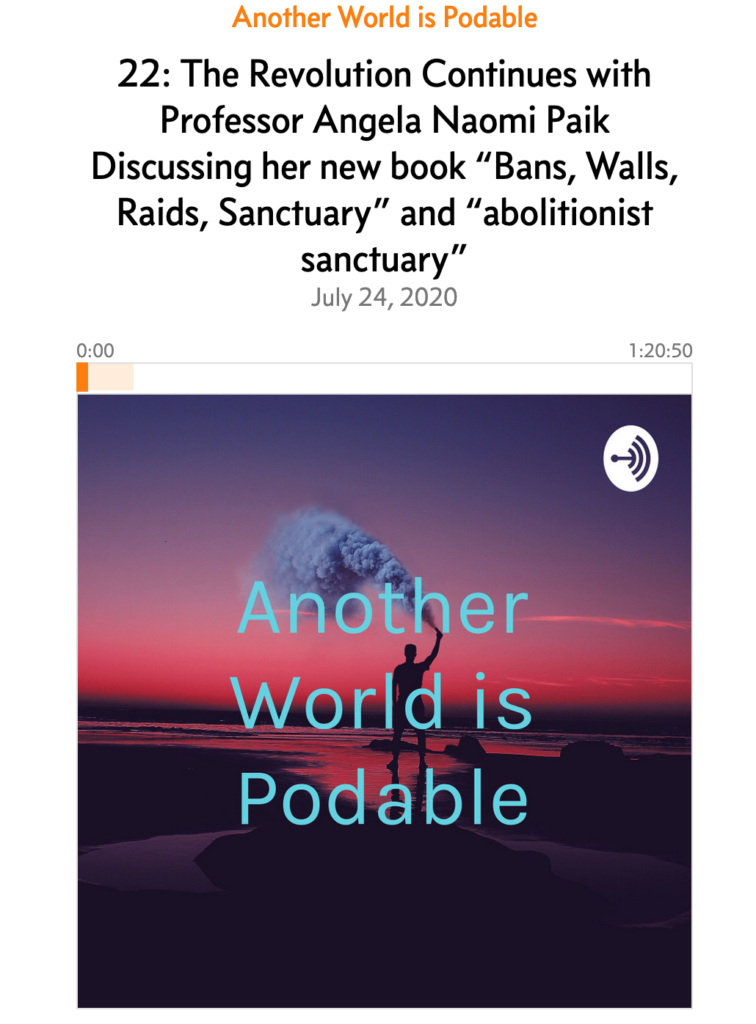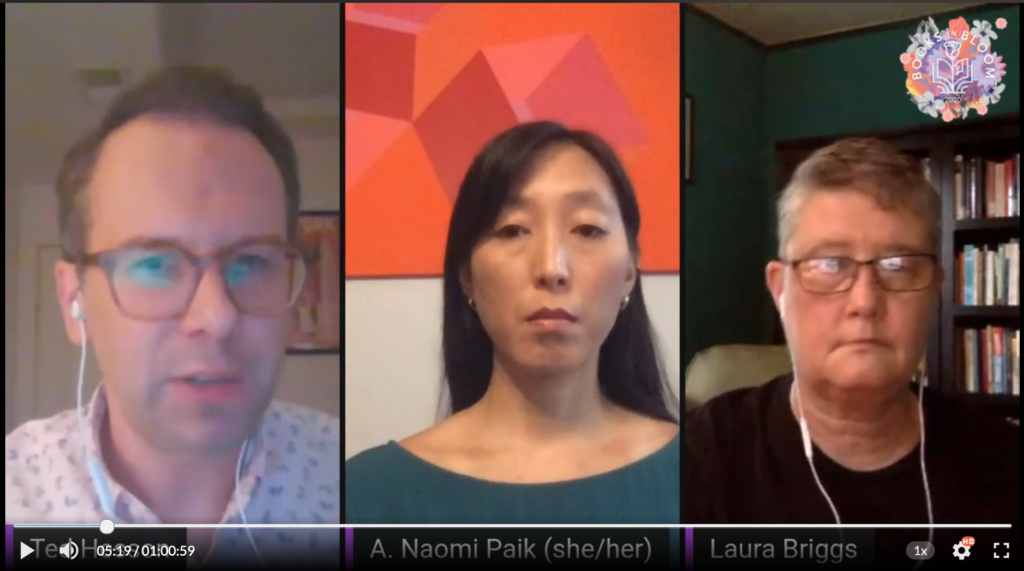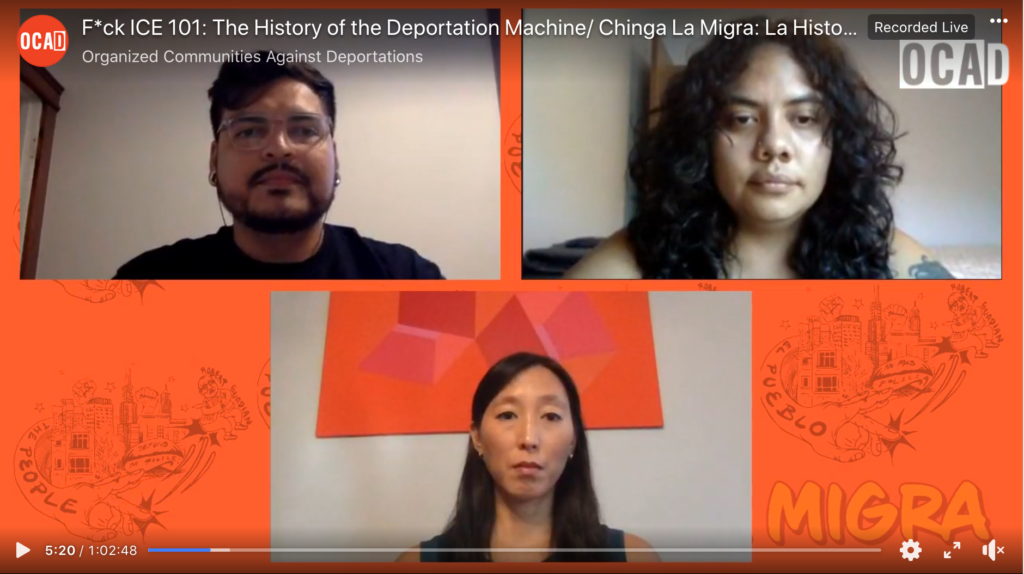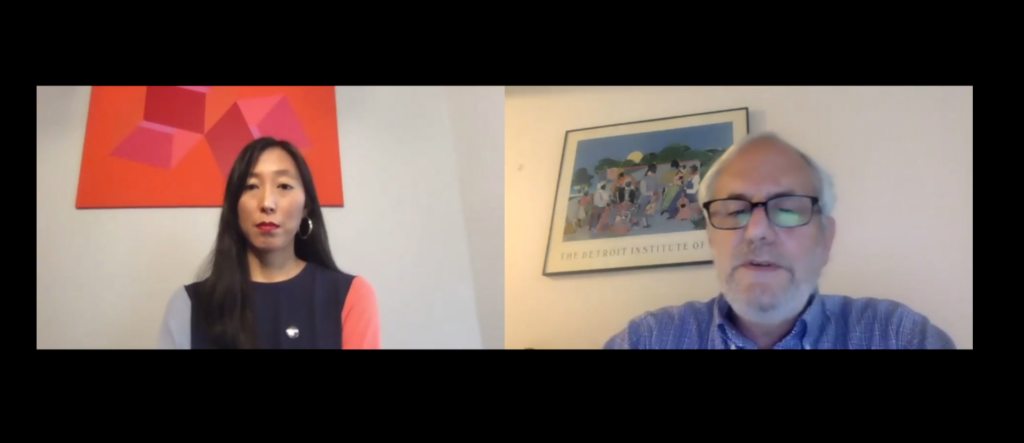Additional Reading, Watching, Learning
The following websites have collected fantastic sets of resources–readings, media, organizing guides, and more–for anyone interested in going deeper than Bans, Walls, Raids, Sanctuary.
For more on immigration history
- The #ImmigrationSyllabus offers a robust reading list, organized by chronology and theme, on U.S. immigration history. It is the work of leading immigration historians and the Immigration and Ethnic History Society.
- This #Microsyllabus on Immigration Enforcement and the U.S.-Mexico Border offers a more selective set of readings on border enforcement. It was compiled by The Abusable Past and Radical History Review.
- This bibliography offers another selective reading list of resources on the history of immigration detention in the United States. Historian Carl Lindskoog compiled it.
For more on abolition
- Abolition Journal created this Study Group Guide for anyone new to abolition. It’s a fantastic resource for sharing and learning together, even if you’re already familiar with abolition.
For more on sanctuary
- This Sanctuary Syllabus brings together readings that respond to the questions, “why sanctuary,” “who needs sanctuary,” and “how do we organize in precarious times”? NYU Sanctuary and Public Books compiled it.
Media Resources
UC Press, Q&A with Naomi Paik
I spoke with UC Press Editorial Director Kim Robinson on U.S. immigration and why we need an abolitionist sanctuary movement. The video provides an overview of the book’s main arguments. (25 minutes)
"Underlying Conditions: Immigration and COVID-19," Brown University, Center for the Study of Race & Ethnicity in the Americas
“Underlying Conditions” is a series engages various experts on the dynamic and multifaceted impact of COVID-19 on already vulnerable communities of color.
In this episode, Professor Tricia Rose talked to me about the pandemic’s impact on immigrant communities, detention centers, and U.S. border patrol, as well as what sanctuary means in a time of crisis.
Find more of their videos on urgent topics here. (21 minutes)
"Immigration & Identity," Books in Bloom Literary Festival
Laura Briggs, author of Taking Children: A History of American Terror, and I spoke about our books, which both grapple with the longer histories behind urgent crises made more visible by 45’s administration. Journalist Ted Hesson moderated our conversation, which was sponsored by the Books in Bloom Literary Festival.
Find the full video here. (60 minutes)

In this podcast, I spoke with Peter Bloom of Essex University. We spoke at length about Bans, as well as my first book Rightlessness, delving into the meaning of abolitionist sanctuary.
Find it here. (80 minutes)
OCAD, "F*ck ICE 101: The History of the Deportation Machine"
In this teach-in, I speak with Arianna Salgado and Miguel Lopez of Organized Communities Against Deportations on the history of the deportation machine. I take highlights from the first three chapters before taking questions from OCAD and audience members. Find it here. (60 minutes)
Support OCAD, which has been at the forefront of abolitionist immigrant justice organizing in Chicago.
Chicago's Fierce Feminist Book Party
I joined other fierce feminist authors in conversation about our books, moderated by the ever-fabulous Nadine Naber. Here is the description:
“Books recently released that speak to the tremendous upheavals of our times and provide poignant analysis.
Disruptive Situations by Ghassan Moussawi
Suspect Communities by Nicole Nguyen
Lean Semester by Sekile M. Nzinga
Bans, Walls, Raids, Sanctuary by A. Naomi Paik”
Border Inhumanities: How Did We Get Here? - Mahindra Humanities Center, Harvard University
In this panel, I spoke alongside Laura Briggs, Nicole Guidotti-Hernandez, and Kirsten Weld on current immigration crises.
“How did we get here? The Mahindra Humanities Center Andrew W. Mellon Foundation Series on Migration and the Humanities presents a conversation about migration and the southern U.S. border.
According to the 2018 World Migration Report, there will be 405 million international migrants by 2050. Amid climate change, geopolitical instabilities, and authoritarian nationalism, borders have become crucial sites of both proliferating cruelty and outpourings of solidarity. Many of us are asking: How did we get here? And what can we do? This series brings together scholars and activists from multiple fields who can help us confront these questions with humanistic sensibility and depth of knowledge.”
(90 minutes)
I spoke with Alex Aleinikoff, director of the Zolberg Institute on Migration and Mobility at The New School, about abolitionist sanctuary. What is it? How does it relate to the movements to defund the police? What world does it want to create?
This interview is part of the Zolbert Institute’s series, Immigration Short Takes: Race, Immigration, and Black Mobility.
(20 minutes)
In this panel, I spoke with Jenna Loyd and Alison Mountz about
transnational migrant deterrence and increasingly militarized border
regimes in the Americas, Europe, and the Pacific.
This panel traces how rounds of racialized crisis going back to the
1970s have resulted in the construction of the world’s largest system of deterrence, detention, and deportation. It argues that any campaign to end the horrors of family separation and detention must address the transnational deterrence policies in which they are rooted.
(90 minutes)


